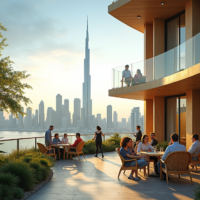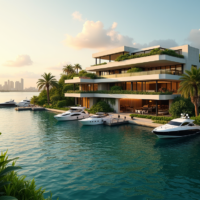When it comes to the real estate market in Dubai, one of the most pressing questions for residents and expatriates alike is whether renting or buying property is the better choice. Each option has its benefits and drawbacks, which can significantly influence personal finances, lifestyle, and long-term stability. In this article, we’ll delve into the intricacies of renting and buying property in Dubai, analyzing the financial implications, lifestyle considerations, and market trends to help you determine the best option for your unique situation.
Understanding the Rental Market in Dubai

The rental market in Dubai is characterized by dynamic pricing, flexible lease terms, and a myriad of options catering to various budgets. Renting can provide a more adaptable lifestyle, allowing individuals or families to uproot and change their living arrangements without the extensive commitment of purchasing property. Moreover, the process of renting can be less complicated, as it generally requires less paperwork and fewer upfront costs compared to buying. Tenants can often enjoy the following benefits:
- Financial Flexibility: Renting usually requires just one month’s rent and a security deposit, making it less financially burdensome.
- Short-Term Commitment: Many rental agreements last for just one year, providing freedom to relocate as life circumstances change.
- Maintenance and Repairs: Landlords typically handle property maintenance, reducing overall responsibility for tenants.
- Access to High-End Properties: Renting allows access to luxury accommodations that may be unaffordable to purchase.
- Market Mobility: Renting gives renters the chance to explore different neighborhoods without long-term financial commitments.
The Advantages of Buying Property in Dubai

On the other hand, buying property in Dubai presents an investment opportunity in a booming real estate market. With the potential for long-term financial gains, owning a home can lead to wealth accumulation and greater stability. Here are some compelling advantages of purchasing property in Dubai:
- Investment Value: Dubai’s real estate market has shown resilience and growth, which could mean significant appreciation in property value over time.
- Rental Income: Property owners can generate passive income by renting out their units when they are not occupying them.
- Personal Customization: Owners have the freedom to modify and personalize their property according to their tastes.
- Long-Term Security: Homeownership provides a sense of stability and a secure place to live without worrying about fluctuating rental prices.
- Tax Benefits: Homeowners may enjoy certain tax exemptions or benefits under local regulations.
Understanding the financial implications of renting versus buying is crucial for making an informed decision. Here are the key costs involved with each option:
Renting
While renting may seem more straightforward, it can cumulatively add up over time:
- Monthly rent payments
- Security deposit (usually equivalent to one month’s rent)
- Potential utility costs
- Renter’s insurance
Buying
Purchasing property, while offering potential for future gains, typically involves higher upfront costs:
- Down payment (often 20% of the property value)
- Property registration fees
- Real estate agent commissions
- Ongoing maintenance and property taxes
- Homeowner’s insurance
Market Trends in Dubai’s Real Estate
The market for real estate in Dubai is influenced by various factors such as economic conditions, population growth, and government regulations. Recent trends indicate an increasing number of expatriates purchasing homes in the city, driven by favorable mortgage rates and attractive urban developments. Additionally, the UAE government has introduced measures to stimulate the property market, including residency visas for property investors and initiatives aimed at encouraging long-term investment. These market trends suggest that buying property may be increasingly appealing, though renters still maintain considerable leverage in negotiating rental agreements.
Conclusion
In conclusion, the decision between renting and buying property in Dubai ultimately hinges on individual circumstances such as financial goals, lifestyle preferences, and future plans. Renters enjoy flexibility and reduced responsibility, while homeowners benefit from investment potential and long-term stability. It’s crucial to assess your situation carefully, weigh the pros and cons of each option, and consider the current market climate in Dubai. Whether you decide to rent or buy, make sure you are fully informed and positioned to make the best decision for your needs.
Frequently Asked Questions
1. Is it better to rent or buy property in Dubai?It largely depends on your financial situation, lifestyle preferences, and long-term goals. Renting offers flexibility while buying can provide a good investment opportunity.2. What are the typical rental prices in Dubai?Rental prices vary significantly based on location and property type. Generally, a one-bedroom apartment can range from AED 4,000 to AED 10,000 per month in popular areas.3. What are the additional costs of buying property in Dubai?Purchasing a property incurs costs such as registration fees (4% of the purchase price), agent fees (2%), maintenance, and insurance.4. Can expats buy property in Dubai?Yes, expatriates can buy property in designated areas, and many developers actively market to expat buyers.5. What is the process to rent a property in Dubai?The process typically involves finding a suitable property, signing a lease agreement, paying a security deposit, and agreeing on utility terms with the landlord.









